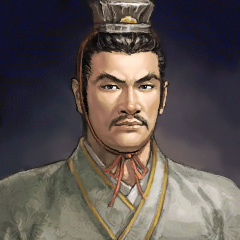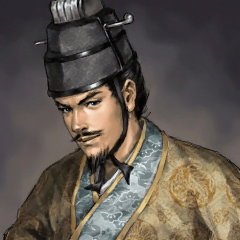Sima Zhao (in Chinese: 司馬昭), also known as Emperor Wen of Jin (in Chinese: 晉文帝), is one of the main protagonists in the later parts of the 14th-century Chinese classic novel Romance of the Three Kingdoms by the late Luo Guanzhong, and its multiple adaptations. He is Sima Yi and Zhang Chunhua's second son, Sima Shi's younger brother, and Wang Yuanji's husband.
Biography
Only his brother Sima Shi was privy to the plans, Sima Zhao is a clever and arrogant minister who can do whatever he wants for his parents and not being disappointed, as he would have repeat more experience. While Sima Zhao was pursuing the Shu troops, Wei Yan was being attacked by the enemy forces on the valley. As a result, Sima Zhao saved his father from Shu famous general Jiang Wei's threaten for his own identity, Even so Sima Shi only needed this opportunity to protect his escape and Wei Yan was murdered in the battle. Since then, Sima Zhao meeting Wang Yuanji for the first time, Wang Yuanji always thought that he belonged to be a slothful and aversion. Later on, Sima Yi used average tricks to deal with Gongsun Yuan. Right before battle, Cao Shuang confronted Shu and Sima Zhao was recruited as general of Shu. As a subordinate of Xiahou Xuan, he led the army out of Luo Valley and was stationed in Xingshi.
At this time, Wang Lin needs to attacked Sima Zhao's military camp at night, Sima Zhao insists that the soldiers do not move, Wang Lin can always withdraw. Afterwards, Cao Shuang and others led the army to retreat. Fei Yi really led the troops to rush to Three Ridges and cut off their returned, the Wei armies won the dangerous road before it passed. Meanwhile, Sima Zhao and his father intends to be prepared to resist Cao Shuang by participating in coup d'état, so these principles must be filled with buoyancy and the plot should be accepted. Immediately after the coup, the Sima family acted as extreme tacticians with invincible signs. Sima Yi stifled the uprising of General Wang Ling, who wanted to make Cao Biao emperor, Sima Zhao is served as deputy commander. During the next few years, Sima Zhao was involved in commanding forces in repelling invasions by Jiang Wei.
When Sima Zhao was at the capital Luoyang, some advisors to the Wei emperor Cao Fang to kill Sima Zhao and overthrow Sima Shi with his forces. The emperor must rejected the plan, but Sima Shi is quite learned about it and dropped it off. On the advice of Empress Guo, he declared Cao Mao a successor and made him as a emperor of Wei. Generals Guanqiu Jian and Wen Qin were outraged and started an uprising, but Sima Shi was suffocated. However, he fell victim to eye disease during the campaign and soon died. At that time, Sima Zhao was stayed in Xuchang, Cao Mao set out to seize power. He ordered Sima Zhao to destroyed the last riot cells in the country in an edict and send Sima Shi's assistant Fu Gu back to Luoyang with the main force. On the advice of Zhong Hui and Fu Gu, however, Sima Zhao must returned to the Luoyang edict and from then on kept an eye on the Emperor and Empress Guo.
During the next few years, Sima Zhao was anxious to secure his power, which is why he increasingly restricted the power of the Emperor and the Empress Mother. He also prepared the takeover. So he was forced the Emperor to grant him the privilege of wearing the imperial robe, the imperial crown, and the imperial boots. Though Sima Zhao has sent confidants to test the minds of the generals in the empire, but he also sent Jia Chong to Zhuge Dan, who is faithful to the imperial family. Sima Zhao therefore called him to the capital, allegedly to promote him. Zhuge Dan sensed a trap and started a rebellion. At the neighboring kingdom Wu he requested assistance, Sima Zhao hurried to Zhuge Dan's Shouchun Fortress and surrounded the city. When Sima Zhao and Cao Mao settled Zhuge Dan's rebellion, Sima Zhao led the army to conquer Zhuge Dan.
Wu forces sent Wen Qin, Quan Yi, Quan Duan, Tang Zi and Wang Zuo to lead the rescue. Wang Ji's encirclement was not completed and led the soldiers into Shouchun city. Sima Zhao commanded the Wei army to surround Shouchun's nearly 180,000 Wu army and rebel forces. They designed them to think that they were going to save the troops, no longer save food, they are recruited and demolished the enemy. Zhuge Dan's subordinates retreated a lot and broke through Wei forces. The fortifications were not completed, and the internal contradictions intensified. However, Zhuge Dan killed Wen Qin, Wen Qin's sons Wen Yang and Wen Hu surrendered to Sima Zhao, then persuaded the city to go down. The most soldiers in the city saw Wen Qin's sons were forgiven, Sima Zhao seeing that the defenders in the city were holding bows and not throwing arrows, they ordered that they could attack the city. Wei forces attacked Shouchun, Hu Fen rushed to Zhuge Dan, and the battle ended.
At this battle, the Wu armies directly entered the battle with more than 100,000 soldiers and Zhuge Dan's 180,000 troops combined with more than 300,000, surpassing the 260,000 people commanded by Sima Zhao and the Wei kingdom also had to defend against the attack of Shu kingdom in the west. Sima Zhao won the war with less wins, he was promoted to the country because of his merits, but refused, Sima Zhao is already executed Zhuge Dan and his family. As well as no general in the Reich dared to face Sima Zhao. He would force the emperor to offer him the Nine Bestowments — a step that put him closer to usurpation — and then publicly declined them. Sima Zhao was once again forced Cao Mao to issue an edict granting Sima Zhao the Nine Bestowments, which Sima Zhao declined again, but which drew Cao Mao's ire. He gathered his associates Wang Shen, Wang Jing, and Wang Ye. He told them that he also wanted to act against Sima Zhao, given the low chances of success.
With the palace guards, and his servants he had armed - he himself carried a sword - he moved to Sima Zhao's estate. Sima Zhao's brother Sima Zhou confronted them with a few men, but fled in the face of the desperately determined Emperor. Jia Chong finally intervened and fought Cao Mao's troupe. But because the Emperor fought himself, no one dared to take it with him. Sima Zhao really wants to deceive Cao Mao in the usual way and that is how he should be executed. Finally, officer Cheng Ji asked Jia Chong what to do. In response, he received to defend the power of the Sima family. So he took a spear and killed the emperor. After Cao Mao's death, the people demanded that Jia Chong be executed, but Sima Zhao forced the Empress Guo to posthumously demean Cao Mao as a commoner; accordingly, he should also be buried. On Sima Fu's request, however, Sima Zhao appointed him prince and had him buried with the honor of a prince.
Then he summoned Cao Huang (later to be named Cao Huan), the grandson of Cao Cao, to the court and declared him emperor, the power of Empress Guo was broken. 19 days later, Sima Zhao accused officer Cheng Ji and his brothers of treason and had them executed with their families, sparing Jia Chong. From then on, no one dared to stand up to Sima Zhao, and the Regent practically held the unrestricted power in his hands. Aggravated by Jiang Wei's incessant border attacks, Sima Zhao has became annoying with the constant threat from the South. He considered having Jiang Wei assassinated, but generals Zhong Hui and Xun Xu advised him to destroy Shu Han once and for all. They argued that Jiang Wei's army was drained after the unsuccessful campaigns and was an easy target. Sima Zhao found that thought good, and he made Zhong Hui and Deng Ai commanding officers of the campaign, although Deng Ai initially had reservations.
For the start, the Wei armies encountered little resistance because the Shu army's strategy was to lure them into the country and then attack them, past the border towns to the strategically important Yang'an Pass advanced and occupied him. Although Jiang Wei was able to rally his forces and prevent another advance of the Wei army, Deng Ai led his troops across treacherous mountain trails to Jiangyou, defeated Shu general Zhuge Zhan and went to the capital Chengdu. Liu Shan feared that Jiang Wei would not arrive in time to defend the city, and surrendered to Deng Ai. In the Wei capital, Luoyang, Sima Zhao had meanwhile obtained the title of Prince of Jin from the emperor and accepted the Nine decorations. After Shu kingdom was destroyed, Deng Ai had become overbearing about his successes, as reflected in his correspondence with Sima Zhao.
Zhong Hui fed Sima Zhao's suspicions by sending him forged letters. Sima Zhao finally ordered Deng Ai to be arrested and Zhong Hui killed the general and took over his troops. However, after this, he declared the uprising, he was betrayed and killed by his troops. After Zhong Hui's rebellion was defeated, Sima Zhao was promoted to the King of Jin, and drafted the laws and civil administration as he wished to prepare for usurpation. He concluded with the Wu peace kingdom. Sima Zhao also decided the question of his successor. He considered his gifted son Sima You suitable. He was also adopted by his uncle Sima Shi, and with his election, Sima Zhao would have honored his brother's accomplishments and heritage. However, the majority of his advisers advised him to choose his first-born Sima Yan. So Sima Zhao designated him as his heir.
A few years later, Sima Zhao was died before he could receive actual imperial authority, although he was buried with imperial honours. Four months later, however, Sima Yan would have the Wei emperor Cao Huan abdicate in favor of him, ending Wei and establishing the Jin dynasty. After his death, he posthumously honored Sima Zhao as Emperor Wen of Jin.
Gallery
Images
Videos
Trivia
- He is one of the playable characters in the Dynasty Warriors series.
| | ||
|
Cao Wei Eastern Wu Shu Han Jin Dynasty Han Dynasty Exclusive Characters Good Organizations | ||















